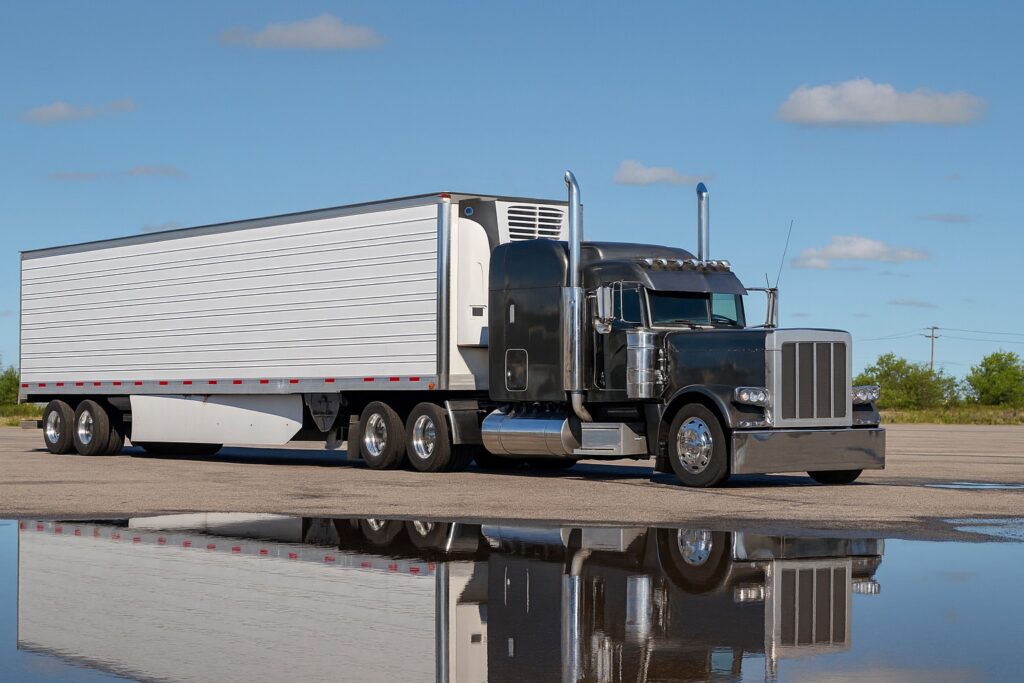Refrigerated trailers—better known as reefers—are the backbone of many trucking businesses. They keep goods like produce, meat, and pharmaceuticals at safe temperatures during transport. Owning a reefer trailer can open doors to higher-paying loads and long-term contracts, but the cost can be overwhelming. That’s why reefer trailer financing is such an important tool for carriers and owner-operators.
In this article, we will explain how to finance a reefer trailer. We will discuss what lenders want and how to handle your monthly payments. This way, you can keep your cash flow healthy.
Why Reefer Trailers Require Financing
A new reefer trailer can cost between $70,000 and $120,000. The price depends on the brand, model, and refrigeration unit. Even used reefers often run tens of thousands of dollars. For most small trucking businesses, paying cash upfront is unrealistic.
That’s where trailer financing comes in. Instead of draining your bank account, financing lets you spread the cost out into manageable monthly payments. This keeps your working capital free for fuel, maintenance, insurance, and day-to-day operations.
How Reefer Trailer Financing Works
When you apply for financing, a lender covers the purchase cost of the reefer trailer. In exchange, you agree to repay the loan in monthly installments with interest over a set term. The trailer itself usually acts as collateral, meaning the lender could repossess it if you default.
Typical loan terms for reefer trailers range from three to seven years. Interest rates depend on factors such as your credit score, business history, and down payment. The stronger your financial profile, the lower your rate will be.
Finance a Reefer Trailer: What Lenders Look At
To get approved, lenders review several key areas:
- Credit Score – A higher score signals less risk, though some lenders specialize in helping applicants with fair or even poor credit.
- Business History – Established carriers with consistent revenue generally receive better terms. Startups may need larger down payments.
- Cash Flow – Lenders want proof that your trucking operation generates enough income to comfortably cover the loan.
- Down Payment – Covering 10–20% upfront reduces the lender’s risk and may secure you a better interest rate.
Benefits of Financing a Reefer Trailer
- Preserves Cash Flow – Financing prevents large upfront costs, leaving money available for daily operations.
- Predictable Monthly Payments – Knowing exactly what you owe each month makes it easier to budget.
- Access to Better Loads – With a reefer trailer, you can haul temperature-sensitive goods, which often pay more.
- Builds Business Credit – Consistent payments can strengthen your company’s financial profile over time.
Real-World Example
Consider a small trucking company that lands a contract hauling frozen foods. A new reefer costs $90,000. Paying cash would wipe out the company’s reserves, leaving nothing for fuel or repairs. Instead, they secure reefer trailer financing with 15% down and a five-year loan term.
- Loan amount: $76,500
- Monthly payments: around $1,500 (at 8% interest)
- Cash flow: stable enough to cover loan payments plus operating costs
Lease vs. Loan: Which Is Better?
Some businesses choose to lease a reefer trailer instead of buying it through financing.
- Leasing: Lower upfront cost and monthly payments, but you don’t own the trailer. Good if you need equipment for a short-term contract.
- Loan/Financing: Higher commitment but builds equity. Once the loan is paid off, the trailer is fully yours.
The right option depends on your business goals. If you plan to run reefers long-term, ownership through financing makes more sense.
Tips for Managing Monthly Payments
- Budget Conservatively – Make sure your income covers payments, fuel, maintenance, and insurance with room to spare.
- Take Advantage of Seasonal Demand – Reefers often earn higher rates during produce season. Use these months to pay down extra on your loan.
- Maintain Your Trailer – A well-maintained reefer runs more efficiently, keeps clients happy, and holds resale value.
- Refinance When Possible – If your credit improves, refinancing could lower your rate and reduce monthly payments.
Final Thoughts
Reefer trailer financing can turn a major expense into a manageable business investment. By spreading costs over monthly payments, you protect your cash flow. This also opens new opportunities in the freight market. Whether you choose to lease or buy, the key is making sure the loan fits comfortably within your budget.






